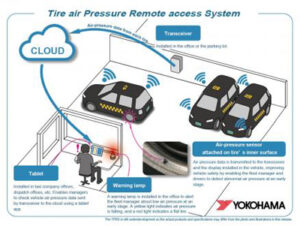Yokohama Rubber begins practical testing of tire solution service for taxi companies
Tokyo, Japan – The Yokohama Rubber Co., Ltd., announced that it has begun practical testing of its Tire air Pressure Remote access System (TPRS) as a tire solution service for taxi companies. The testing began in May and is being conducted together with the Company’s tire sales subsidiary Yokohama Tire Japan Co., Ltd., and with the cooperation of Kyoto Taxi Co., Ltd., and Koshin Taxi Co. The TPRS test is being conducted using tire air-pressure sensors developed by Yokohama Rubber attached to the inner surface of tires mounted on taxis operated by the two companies in Kyoto Prefecture and surrounding areas.
The testing seeks to verify the effect of TPRS and the air pressure sensors attached to tires’ inner surface, which Yokohama Rubber has developed as part of its response to changes in the automobile industry, such as CASE1 and MaaS2. TPRS and the air-pressure sensors attached to tires’ inner surfaces enable car fleet operators and Yokohama Rubber service staff to remotely monitor tire air pressure, temperature, and vehicle location. The system greatly reduces time spent checking tires at the start of each day and records air-pressure data. It enables early detection of slow punctures that cause gradual air leakage. It also contributes to proper tire maintenance, helps prevent inspection irregularities, and improves fuel efficiency by maintaining proper air pressure. In addition, the system’s ability to detect tire abnormalities in real time can help prevent accidents. Detection data is transmitted to a cloud server, enabling the taxi company’s fleet managers and Yokohama Rubber’s sales offices to monitor tire air pressure. An alarm device installed in the taxi operator’s office will notify the fleet manager when air pressure falls to a level that will reduce fuel efficiency or indicates a possible slow puncture. Unlike the conventional valve-type TPMS (Tire Pressure Monitoring System), air-pressure sensor attached to tires’ inner surface can be used on a wide variety of vehicles and wheels as an aftermarket part that can be used with any wheel type. Yokohama Rubber previously has conducted practical testing of its TPRS for corporate cars and car-sharing companies, but the current test being conducted with taxi companies that require strict tire management is aimed at establishing a business model that contributes to the improved safety and economical operation of taxi fleets.
The CASE and MaaS initiatives included in Yokohama Transformation 2023 (YX2023), Yokohama Rubber’s medium-term management plan for fiscal years 2021–2023, include the promotion of a new tire solutions service based on the development of a SensorTire (Internet of Things [IoT] tire) with sensing functionality and stronger, more flexible service capabilities. In February 2021, Yokohama Rubber announced its SensorTire Technology Vision, a medium- and long-term technological development vision for passenger car tire sensors. The aim of this new vision is to provide continued support for the safe and sound movement of people while also addressing changes in mobility demand by providing data obtained from IoT tires fitted with sensing functionality to drivers and operators of a diverse range of automobile-related services. To achieve the goals of this vision, Yokohama Rubber is conducting practical testing with partners from various industries.

